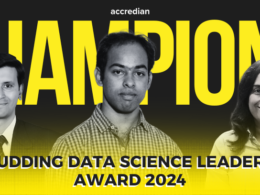Presenting to you the Accredian Spotlight Budding Data Science Leader interview series. This is a series of interviews of budding data science leaders, enrolled with Accredian in different courses. These students coming from diverse backgrounds and even different fields, have rich experience in their own domains. They have interesting views to share with the world, their experience in the industry, what brought them to the field of data science and many other such interesting aspects. These interviews will enrich the readers about the insights, trends and many other related points.
In a recent conversation, we spoke to Ashish Chaudhary who is enrolled in the GCDAI program at Accredian.
Name: Ashish Chaudhary
Current Organisation: ICICI Bank
Total Experience: 5.7 years
Batch: Global Certificate in Data Science and Artificial Intelligence (GCDAI) January 2019
Ankita: Ashish, could you walk me through your career journey; what has been your educational background, your technical product expertise and the current role that you’re working in?
Ashish: I am a Chemical Engineer by profession and I started my professional journey in the same field. I did my engineering from the University of Mumbai and started working as a Chemical Engineer in a small company in Mumbai. Later, I decided to go for an MBA and did it in marketing. Post that, I opted for key accounts management job and this is my current profile too. The first three years of my professional journey was into manufacturing and for the last six months, I’m into banking, handling key accounts for ICICI bank.
Ankita: What got you interested in Data Science and Machine Learning, given your background as an MBA and a Chemical Engineer?
Ashish: When I applied for my job offer after MBA, I was working as a key accounts manager. So, that was mainly into the manufacturing industry, the stainless steel industry. Immediately I started working, I realized that I have a great exposure to data as we were working on SAP. We also had a lot of data coming in from the other ERP systems like SAP. I started working on data for my customers and drawing insights from it. And, for this task, I was using Excel, but the data used to be huge.
I had to work on different data sets altogether, different Excel files, and then concatenating or combining them to present a holistic view of what we have for our customers; what are the insights here, so that the same can be presented to the management. It was from this point that my interest in data generated.
But I didn’t know very much about Data Science at that point of time. Even then I did quite well with the data presentation that I was making to the management and the insight I succeeded in drawing from those particular data sets in my old company. As a result, I decided to go for some advanced excel learning course. Along with this, I also researched about Data Science and decided that I’ll be following Data Science very closely. To take a professional and guided step towards making a mark in Data Science, I opted to pursue GCDAI with Accredian. Now, I am ready to move ahead in my journey of Data science.
Ankita: Ashish, could you tell me about the tools and packages in Data Science and machine learning that you have mastered so far.
Ashish: I have completed the basics of Python and Statistics and also finished the Exploratory Data Analysis (EDA) and Machine Learning Basics (ML-1). I have just finished one class of machine learning intelligence. I have so far learned NumPy, Panda, Matplotlib, Sci-kit and Seaborn.
I have acquired good knowledge about Panda as I worked vigorously on Panda in my EDA. My intention in doing so was that I can have good depiction for data analysis on my data sets.
Ankita: My next question to you would be- what is the goal of Data Science?
Ashish: The goal of Data Science is better decision making with quantifiable evidence. Second, I would say, is improving the relevance of your product. This is purely based on my experience while working in the previous organization. With the information derived from various sources and worked upon after applying the best Data Science practices, this information can be used to take major decisions in key strategic practice for real business. Aiding businesses take informed decisions is the key goal of Data Science.
Ankita: How has Data Science evolved over the last few years?
Ashish: To answer this, I would begin by taking a reference of an article from Forbes. In this article, John Tukey, American statistician, first wrote about the future of data analysis in 1960. There must have been some data related things going on in the past i.e., since 1953. So in 1960, they started discussing about Data Science that how important it is to use a computer in your Data Analysis and find insights from the data. It was from the 1970s that data processing was being talked about and data mining and other concepts gradually gained momentum after that.
In 1977, the International Association for Statistical Computing said that their mission was to link traditional methodology with modern computer technology and use the domain expertise to convert data into information and knowledge. So, the user data that was there in 1950 was not of much use and how the data is now being used to gain information and knowledge. Since 2000, specific data is being used to create more insights about the business and take some steady decisions that increase the standard of your business. This is the evolution of data- from raw data to data visualization. The term ‘Data Science’ was first coined in 2001. Data science leverages this data to gain information and knowledge and makes some very important and strategic decisions.
Ankita: Any current trends in the Data Science field that you are most excited about and that you see becoming very big in the future?
Ashish: Yes, artificial intelligence, machine learning and IoT are some of the important trends. I was reading about this particular Artificial Intelligence trend of 2019 that is, the use of chatbots to converse with the customers in the retail or banking industry and they are using artificial intelligence for that. So, I think this would be something very big in the future, along with some machine learning expertise that could be used in several other businesses.
Ankita: So, when you entered this Data Science space, were there any initial challenges that you faced? And If yes, then how could you overcome it?
Ashish: Yes. I don’t have any programming backgrounds and I’m a non-programmer. This is because since the time I started my professional journey, I’m handling key account management. It is actually client servicing, where you have to deal with a lot of data, but there’s no language you’re using because you don’t handle much larger data sets. This is why, when I started learning Python and other things, it was a challenge for me. At Accredian, when my mentor Suchit, spoke about Python, I could understand it very easily. But when it came to practice, I started facing challenges. But I think I overcome those challenges after I practiced a lot and it was my daily routine to practice the packages I was using. As a result, I can handle Python and work on it very easily.
Ankita: So that brings me to my next question- how are you able to juggle between your job and studies? Do you follow a schedule or how is it?
Ashish: This is actually a very good question. The usual office timings maybe 9 am to 5 pm but most of the time, it stretches beyond that; be it due to work or the travel time it takes. This was actually a big challenge for me when I started at Accredian; to manage between the work and the studies. I started utilizing my time at night after I came from office. So, daily two hours, i.e., 10pm to 12 am was the time for my Data Science studies. At the onset, it was quite challenging as coming home after 10-12 hours of work and then sitting down to study was a bit difficult. But I think if you have decided something and you’re passionate about it, you can do it, no matter what. It looks like a very fancy sentence to speak, but it works. If you study daily and make it a schedule, it becomes a habit. Now I’m doing it regularly and following this course very passionately because I wish to complete this and gain knowledge.
Ankita: Are there any blogs that you read?
Ashish: I regularly read blogs on towardsdatascience and medium. The reason is that they provide me with the latest and updated information; whatever is happening in the Data Science world, machine learning technique and almost anything.
Ankita: Do you follow any Data Science and AI influencers?
Ashish: I am following Andrew NG since long. Also, we had a session by Dr. Kirk Borne at Accredian. So, I started following him after that. The reason is that I after knowing that he has authored more than 100 research papers in this field and regularly shares insight with his readers, I got the vision of Data Science, what actually it is and where it is heading to. Ankita: At Accredian, students are encouraged to maintain high quality GitHub profiles. Have you also built a GitHub profile? How do you think this will help you?
Ashish: I have a GitHub portfolio and I am working on it. This GitHub profile is a must for any Data Science aspirant or Data Scientist because it is your new LinkedIn. It is equally important as your resume; just how crucial it is to have a resume, similarly, it is critical to have a vivid GitHub profile that showcases your work in your field (Data Science, AI or Machine Learning). So maintaining a detailed and interesting GitHub profile will increase your chances to get to the interviews and will always help you.
Ankita: What are some of the applications of Data Science & Machine Learning in the industries that you are excited about?
Ashish: Like I said earlier, the emergence of chatbots is I think one of the very big applications of what we are doing in Data Science and AI. In the banking industry, fraud detection and cybercrime detection are some of the applications that I am excited about. For me, self-driving cars and IoT are all exciting uses of Data Science I am looking forward to. These applications of Data Science, machine learning and AI and are set to grow and become very big in the future.
Ankita: True. What will be your advice to anyone who wants to start a career in Data Science and who is actually a fresher in this field?
Ashish: I would recommend that if you really like data and want to find something good out of it; you like data analysis and have an analytical mind, so you should definitely go for Data Science. Now, what’s happening is that people are just attracted towards it because it is the rage. I will cite my example here. I was already working on design and loved doing analysis and finding something out of data, this is why I decided to come into Data Science. So, for someone who is coming to Data Science, must be passionate about data; working on data and cleaning it.
Data cleaning and wrangling is a crucial part of the job and you should not shy away from doing it. So, I think when anybody wants to join Data Science, he must do so only if he is passionate about data and is clear about what role could be offered to him. One should enter this field only if one is clear on these fronts and knows about the reality and not only because Data Science is the sexiest job of the 21st century.
Ankita: My last question of other request to you would be if you would share anything, if you want to share anything about inside your journey then said so far, the feedback anything that you want to share with us?
Ashish: Initially, when I decided to go for a Data Science online course, I searched about a lot of them. But eventually, I decided to go with Accredian. In my case, there was a word of mouth that worked for me in making this choice as I learned about Accredian through some of my mutual friends. Suchit was my mentor and he played a crucial part in my journey at Accredian. He always encourages the non-programmers and how easy it could go for them. He tells us that Python is an easy language and is for everyone. I am very thankful to Accredian, especially Suchit, for making me a confident person. This confidence is actually taking me further into the Data Science journey. I also attended a session by Manav and he too was very encouraging. He informed us about how Data Science can shape our lives and prove to be beneficial in the future. The mentors and the academics team at Accredian are all extremely helpful. I would give Accredian a perfect 10 for all the efforts they put in answering our queries, mentoring us, grooming us for the future and creating a scheduled study plan for us.
Ankita: Thanks a lot for such kind and generous words.
Ashish: I am being honest and saying the truth that for non-programmers who have never worked on Python and Data Science, there can’t be a better place than this. The way mentors have taken the classes is very helpful, even for the non-programmers. This mode of teaching has never made me feel if I had a programming background or not.
Ankita: I’m sure you’ll do great in Data Science. Thanks a lot for your time. It was really nice speaking to you.
Ashish: Thank you very much.





